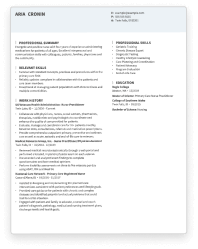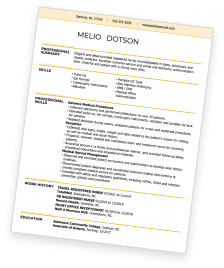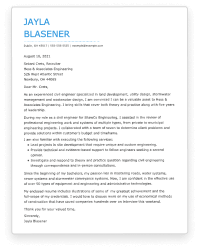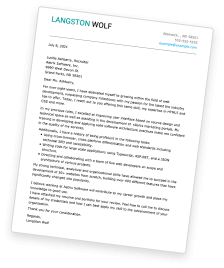Film Resumes: Overview
As a film professional, your end goal is to contribute, in your own unique way, to the magic of the big screen. Your day-to-day responsibilities might be to review scripts, select cast members, scout locations, edit footage, create visual effects, or mix sound, but at the end of the day, it all comes together to achieve the objective of engaging, inspiring, and entertaining audiences everywhere.
Many different professionals work collaboratively to bring a production to life. Some key roles in the world of film include:
- Film Director
- Cinematographer
- Animator
- Videographer
- Sound Engineer
- Producer
As you almost certainly already know, success in a film career requires a passion for storytelling and visual arts and a sizeable dose of creativity. In addition, you also typically need good attention to detail, strong collaboration and communication skills, and the required technical expertise.
The challenge is to capture and promote these qualifications and capabilities in your resume in a way that captivates potential employers. That can be tough, but fortunately, we’re here to walk you through the resume-building process.
Whether you’re crafting a cinematographer resume, a film director resume, or a screenwriting resume, draw on our substantial collection of resume examples for guidance and use our professionally designed resume templates to simplify the writing experience.
Filmmaker Resume: Getting Started
As a filmmaker, your first step to writing a resume is knowing which format to choose. There are three resume formats, and each has its strengths. Pick the option that best suits your experience in the industry and career goals.
Chronological Resumes For Filmmakers
The chronological format emphasizes work history and highlights career progression over time, making it ideal for experienced film professionals who want to showcase the evolution of their skills.
If you, for example, started as an assistant director and gradually moved up to a director role, you’ll want to use this format to illustrate your career journey.
The chronological resume is the most popular format due to its focus on work experience. Many employers highly value experience because it adds credibility to your skills.
Functional Resumes For Filmmakers
The functional resume format, on the other hand, shifts the focus away from career history and onto skills and education. It helps to show that you have the capabilities to do the job even if you lack experience in the film world or have been out of the industry for some time.
If you’re applying for an entry-level job as a boom operator, production assistant, or costume attendant, for instance, you may want to consider a functional resume.
However, keep in mind that by minimizing the focus on work history, employers may be less convinced by your claimed skillset, which means you will need to put extra effort into proving your qualifications as a filmmaker.
This is where having a portfolio of work, such as films you have directed, edited, or produced, can be really helpful to supplement your resume.
Combination Resumes For Filmmakers
As the name suggests, the combination resume mixes elements of both the chronological and functional formats, giving equal importance to skills and work history.
This is an ideal film resume format if you have less than 10 years of experience in the industry, have a highly specialized skill set, or want to change careers and break into film production from a different field.
Choosing A Format:
In the end, you should pick the resume format that best highlights your qualifications in film. However, that being said, we recommend that you pick the chronological resume in most circumstances.
The film and video industries highly value the products they create. Employers are going to want to see what you can do and having a sizeable work history section is extremely helpful to validating your qualifications.
If you lack experience or feel unsure about your work history, you may consider the functional resume, but you will need to supplement it with a portfolio of work that shows your abilities.
Also, consider your work history that isn’t directly related to film and focus on your transferable skills that you can use the combination or chronological formats.
How To Write A Resume For Film Professionals
In the same way that a script is a good starting point for producing a film, a clear resume outline is a helpful launch pad for crafting a competitive resume.
Our film resume templates and film production resume examples will come in handy here, as will the following advice on how to navigate each step of the resume-writing process.
Contact Information
Your name and contact details should be prominently displayed at the top of your film resume so that hiring managers can get in touch easily. Include your:
- Full name
- Phone number
- Professional email address
- Location (city/town and state)
If you have a LinkedIn profile, online portfolio, or IMDb page, include links to these resources to provide direct access to your work in film.
Resume Summary or Objective
Craft a cinematic introduction for your resume in the form of a concise summary or objective statement that sets the stage for the hiring manager.
If you’re a seasoned film professional, write a resume summary that touches on your filmmaking identity, the genres you specialize in, your most notable skills, and standout achievements.
If you’re changing careers or just starting out in the film industry, opt for a resume objective that briefly outlines what you can bring to the table while highlighting your career goals and aspirations for the role.
Remember to keep your summary or objective brief – no more than three to four sentences.
You can draw inspiration from this example of a summary statement for a video editor:
“Hardworking and passionate video editor with over 8 years of film editing expertise and a proven track record of transforming raw footage into compelling visual narratives. Proficient in industry-standard editing software (Adobe Premiere Pro, Final Cut Pro, Pinnacle Studio 26 Ultimate) and previously recognized for strong attention to detail and commitment to delivering high-quality productions. Adept at collaborating with diverse teams and exceeding all project expectations.”
Work History
Give film industry employers an overview of your experience in the field by presenting your work history in reverse chronological order (starting with your current or most recent role and working backward).
Each entry should include your job title, the name and location of the organization or production company you worked for, your dates of employment, and between three and five bullet points detailing your responsibilities and achievements in that position.
Highlight specific projects you’ve been involved in and use film industry terminology to showcase your understanding of the field.
Boost the impact of this section by using strong action verbs, like “conceptualized,” “directed,” “visualized,” and “enhanced”, and describing your accomplishments with numbers and metrics. Quantifying work experience provides unique context and demonstrates your specific value, which is very helpful for employers.
Here’s an example of an entry from the work history section of a filmmaker resume:
Film Production Manager | Red Kite Productions – Los Angeles, CA 06/2016 – 05/2022
- Led the successful execution of 15+ film projects, overseeing pre-production, filming, and post-production phases.
- Managed a diverse team of 10+ crew members, ensuring seamless communication and collaboration, leading to a 30% reduction in production delays.
- Implemented cost-saving measures by optimizing equipment usage and renegotiating vendor contracts, resulting in a 17% reduction in production expenses.
- Spearheaded the development of innovative post-production workflows, improving the quality of final edits and achieving a 28% increase in positive audience feedback.
Skills
Make it easy for time-pressed hiring managers to assess your most notable abilities by crafting a separate section with bullet points pinpointing six to eight key film-related skills for your resume.
List both technical skills (including film production software and equipment you’re familiar with) and important character traits, with a focus on the capabilities mentioned in the job description.
A movie director resume, for example, might emphasize hard skills like storyboarding, script analysis, sound design, and shot composition, and soft skills like creativity, collaboration, adaptability, and leadership.
You should always tailor your resume to the job you are applying to and pick the most relevant skills. However, here are some of the most popular hard skills and soft skills for film resumes that you can consider including:
Top 5 Hard Skills for Film Resumes
- Video Editing Software Proficiency: Mastery of industry-standard video editing software like Adobe Premiere Pro, Final Cut Pro, and Avid Media Composer ensures precise and efficient film editing that meets modern standards. This computer skill set allows you to transform raw footage into polished, cohesive narratives and boost the impact of your storytelling in film projects.
- Understanding of Cinematography: An in-depth understanding of lighting, composition, and camera techniques is key for capturing high-quality footage that aligns with the artistic vision of a film. Proficiency in this area helps to elevate the visual quality of film productions and contributes to the creation of aesthetically pleasing scenes.
- Scriptwriting: A strong grasp of scriptwriting is a fundamental skill for anyone working in film production, not only those crafting a film writer resume. It ensures coherent storytelling, well-defined characters, and engaging dialogue – cornerstones of a successful film project.
- Sound Design and Audio Post-Production: Sound heavily influences the emotional experience of film viewers. Knowledge of sound design principles and proficiency in audio post-production tools equip you to achieve optimal sound quality in productions and enhance the narrative by incorporating impactful music, dialogue, and ambient noise.
- Storyboarding: The ability to create detailed storyboards provides a foundation for visualizing and planning film scenes. It’s a skill that ultimately helps to guide the entire production team.
Top 5 Soft Skills for Film Resumes
- Cross-Crew Collaboration: Film production is a joint effort that wouldn’t be possible without strong communication and teamwork. The ability to collaborate effectively with others is essential for working seamlessly with fellow crew members to bring a shared vision to life.
- Creativity: The film industry thrives on fresh and imaginative storytelling. A talent for thinking outside the box, generating innovative ideas, and bringing a unique perspective to discussions will, therefore, set you apart as a desirable candidate in this field.
- Attention to Detail: Every little detail matters when it comes to film production. A good eye for detail is a powerful weapon when trying to meticulously plan shots, achieve continuity in scenes, and ultimately deliver a perfect final product that captivates audiences.
- On-Set Multitasking: Film professionals are often required to juggle multiple responsibilities simultaneously in a dynamic and ever-evolving environment. Strong multitasking skills make it easier to handle the many details that contribute to a successful film, enhancing productivity and supporting adaptability in an industry where flexibility is key.
- Time Management: Filming often operates on a tight schedule, with many tasks requiring completion within specified timeframes. The ability to manage your time efficiently helps to ensure that the pre-production, production, and post-production phases align seamlessly, preventing delays and improving the chances that the final film will be delivered by the deadline.
Education
Show that you’re qualified to do the job with an education section providing a quick snapshot of your studies and training.
If you’ve earned a degree, include the full title, your major, the name and location of the institution you attended, and your date of graduation.
Only mention your GPA and details about specific coursework or academic awards if you’re a recent graduate with minimal experience.
You can also list any film-related workshops or courses you’ve completed, as well as relevant certifications, as proof of your skills and dedication to ongoing professional development in the field.
Additional Sections
The five sections above are core requirements for any resume, but a film resume can benefit from additional sections that highlight specific aspects of your experience, skills, and achievements in the industry.
For example, if you believe it’ll boost your application, you could consider including extra sections for:
- Certifications
- Key projects you’ve worked on (with brief descriptions of each)
- Film festival awards and industry recognitions
- Professional memberships
- Languages you can speak
Note: If you provide additional sections to your filmmaker resume, ensure you have enough space. Most resumes are only one page long, two pages if you have over 10 years of relevant experience.
Your resume needs to be easy to read and quickly communicate your filmmaking qualifications, so don’t overcrowd the page!
Top 5 Certifications For Film Professionals
Film-related certifications not only verify your skills and validate your knowledge, but also boost your credibility and appeal in job applications. Below you’ll find a few top software-related credentials worth pursuing if you want to elevate your film resume for particular positions.
- Avid Certified Professional: Media Composer: A well-recognized certification in the film industry, this credential proves that you possess the advanced job-ready skills needed to use Avid’s Media Composer tools to do multi-camera and script-based editing and create top-quality professional video content.
- Adobe Certified Professional in Digital Video Using Adobe Premiere Pro: This designation validates your knowledge of Adobe Premiere Pro and your ability to apply this industry-leading film editing software program to organize video projects, create and modify visual elements, and publish video and audio sequences.
- Final Cut Pro (FCP) Certified VideoPro: Aimed at professionals working in film and television, the FCP VideoPro certification verifies your expertise in editing and producing professional-quality video content for feature films using Final Cut Pro. It covers knowledge of video timeline organization, transitions and effects, color correction, working with sound, and much more.
- Avid Certified User: Pro Tools: Earning this credential demonstrates your understanding of how to navigate Avid Pro Tools, standard software in audio post-production for film. The title showcases your ability to handle sound design, editing, and mixing tasks critical for delivering top-notch audio in movies.
- Adobe Certified Professional in Visual Effects & Motion Graphics Using Adobe After Effects: The best way to back up your skills in Adobe After Effects, this reputable certification speaks to your competence in creating striking motion graphics, animations, and visual effects in the post-production phase of filmmaking.
7 Tips For Writing A Film Resume
It’s no easy feat to create a film resume that both reflects your qualifications and resonates with employers in the dynamic and competitive landscape of the film industry. Here are some key tips to follow to elevate your document and boost your chances of landing your next role in film creation.
1) Make Every Submission Unique: The world of film is as diverse as it comes. No two roles are the same, even if the job title is identical, so no two resume submissions should be the same either. Always customize your resume to align with the specific requirements of each film job.
Highlight relevant skills, experiences, and film projects that demonstrate your suitability for that particular position, and include keywords from the job description to ensure that your resume checks all the boxes when screened by an applicant tracking system (ATS).
2) Include a Reel or Portfolio Link: If you have an online portfolio or showreel, provide a link to it in the header of your resume. This makes it easy for employers to visually assess your work and get a feel for your storytelling abilities firsthand.
Remember to ensure that your showreel is well-curated and showcases a broad range of your film projects.
3) Highlight Film-Specific Technical Proficiencies: With film production now being heavily tech-driven, technical expertise has become a key differentiator for those working in cinematography, video editing, sound design, and production roles.
Create a skills subsection in your resume to highlight your technical competencies and computer skills, specifying the software and equipment you’re familiar with.
4) Provide Evidence of Collaboration and Teamwork: Given the collaborative nature of the film industry, it can be beneficial to shine a light on your interpersonal skills and emphasize your ability to work effectively in a team. In your work history section, highlight instances when you collaborated with fellow crew members to achieve a shared vision and successfully bring a project to completion.
5) Mention Film Awards and Recognitions: If you’ve received festival awards, industry accolades, or critical acclaim for your work in film, feature these prominently in your resume in a dedicated section.
Doing so will showcase your excellence in the field, add a touch of prestige to your profile, and enhance your credibility as a standout professional in the competitive film industry.
6) Incorporate Visual Elements: In the creative realm of film, your resume’s design can play an important role in making a memorable impression.
Consider adding visual elements, like a subtle film reel or camera icon, and introducing a muted color palette to reflect your artistic side. This not only adds a touch of personalization and aesthetic interest, but also aligns with the film industry’s visual nature.
7) Balance Creativity with Professionalism: While the film world values originality, it’s important to prioritize a polished and professional resume design that helps employers navigate your information easily. Inject your document with a measured dose of creativity that speaks to the industry, but opt for a well-structured layout that maintains a sense of order and readability.
Helping Job Seekers Like You


Save Time With Hloom's Resume Builder
Key Takeaways
- Modify your resume to align with the specific requirements of each film industry role you apply for, focusing exclusively on relevant qualifications and achievements.
- Make your application more memorable by including concrete examples of your contributions and impact in previous roles, quantifying your accomplishments whenever possible.
- Open your resume with a succinct but impactful summary or objective statement that sets the stage for the hiring manager, outlines your unique value proposition, and spotlights your most notable skills.
- Emphasize role-specific technical skills and software knowledge, listing film industry tools and equipment you’re proficient in.
- Pick a design that balances creativity with professionalism to reflect your artistic side and present a polished, competent image.
Save Time With Hloom's Cover Letter Builder


FAQ
Citations
- Bureau of Labor Statistics, “Film and Video Editors and Camera Operators,” Occupational Outlook Handbook, September 2023.
- Bureau of Labor Statistics, “Producers and Directors,” Occupational Outlook Handbook, September 2023.
- Bureau of Labor Statistics, “Special Effects Artists and Animators,” Occupational Outlook Handbook, September 2023.
- University of Michigan, "Resume Resources," November 2023.










